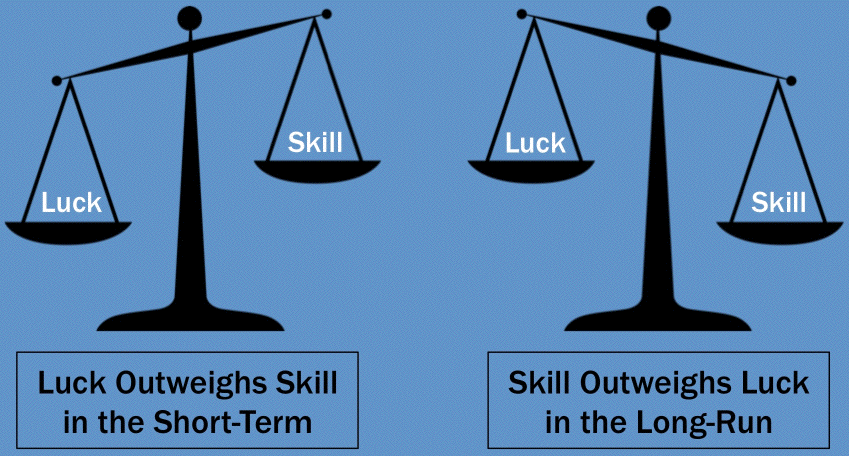
Play for the Long Term
To make money playing poker, you need to play for the long term and accept the risks posed by the short term.
But what does it mean to “play for the long term”? First of all, it's important to mention that we are not talking about a different game. There is a “correct” way to play each hand so that the game brings you money, and your goal should be to play each hand the correct way. Indeed, when playing poker, you should already be thinking long-term, because focusing on short-term results can make you vulnerable in the game and lead to psychological mistakes in poker. If you play for the long term, you won't care about the results of a single session, especially a single hand. Playing for the long term, you will be confident in playing in a way that makes you a winning player in the long run, regardless of your short-term results.
A player who pays a lot of attention to their short-term results will be ecstatic after a good winning session and depressed after a losing one. They will also be lenient with their mistakes.
Best Poker Rooms
Playing to Break Even
Players who focus on the short term will do everything possible to avoid a losing session. If they get stuck, they tend to play until they break even. This approach can have catastrophic results.
First, they may continue playing while tired or bored, which means they are not playing their best game. Second, this approach can lead to “tilt”, especially if they continue to lose, making them doubly upset. Of course, being on tilt, they will likely lose even more money, becoming even more determined to win back at least some of it. As you can see, the result is quite dangerous and cruel.
Protecting Wins
The opposite scenario is also possible. Short-term players love to record a winning session and overvalue it. A popular saying among casual poker players is “Quit while you're ahead,” which stems from the depression of being ahead and then losing all your winnings.
One of the worst possible outcomes for a short-term player is losing already won money, even if they lose it playing good poker. They will be inclined to quit while ahead, even if they are in a good game and playing well.
Alternatively, a short-term player might do something even worse. They might stay in the game but start playing very conservatively, reducing the number of hands with positive value, making the game such that it gives them the smallest chance of losing a large sum of money.
Getting Angry at Bad Players
A player who cares about short-term results will be very annoyed when they lose to one of their opponent's bad plays. They think their individual session results are important, and every time they lose a pot, the player will think they should have won that pot, especially a big one, and it hurts. This can lead to resentment towards the player who played poorly and even start playing hands they shouldn't just to get back at the opponent. Alternatively, they might attack the bad player, which is always a bad idea because the bad player might leave the game or at least start playing better. A player who gets angry losing a pot to a bad opponent's play risks starting to play poorly themselves, trying to win back the money they lost.
Changing Your Game Unthinkingly
Playing for the long term, you understand that you can lose money in the short term through no fault of your own. On the other hand, a player concerned with the short term will instinctively try to change their game if results are going poorly. Don't get me wrong, it's a good idea to constantly review your game and adjust it accordingly, but it's a very bad idea to change your game based on short-term results. Note that this is a common mistake among intermediate players. When they have a series of bad results, they constantly make poor adjustments to their game to improve results without understanding (or accepting) that their losses are mainly due to short-term luck.
In summary, playing for the long term is the only way to play successful poker. Players fixated on short-term results usually suffer unjustified mental anguish, resulting in poor decision-making while playing poker.
Source: The Poker Mindset: Essential Attitudes for Poker Success





